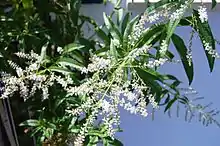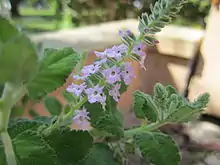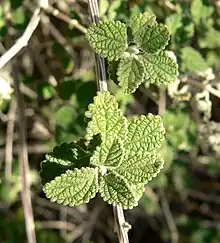Aloysia
Aloysia is a genus of flowering plants in the verbena family, Verbenaceae. They are known generally as beebrushes.[2] They are native to the Americas, where they are distributed in temperate climates, as well as in subtropical and desert climates.[3] The genus is named for Maria Luisa of Parma (1751-1819), wife of King Charles IV of Spain.[4]
| Aloysia | |
|---|---|
 | |
| lemon verbena (Aloysia citrodora) | |
| Scientific classification | |
| Kingdom: | Plantae |
| Clade: | Tracheophytes |
| Clade: | Angiosperms |
| Clade: | Eudicots |
| Clade: | Asterids |
| Order: | Lamiales |
| Family: | Verbenaceae |
| Genus: | Aloysia Paláu[1] |
| Species | |
|
about 30, see text | |
Description
These plants are subshrubs, shrubs, or trees growing 0.5 meters to 15 meters tall.[3] Many are very aromatic.[4] The stems may be four-angled and smooth when new, becoming more angular or rounded and often furrowed or striated with age. The leaves are evergreen or deciduous in the dry season. They are often oppositely arranged or whorled, but can be alternate or clustered. The blades are variable in shape, toothed or smooth-edged, and hairless to rough-haired on the upper surfaces. The undersides may have glandular hairs. The inflorescence is usually a raceme of widely spaced clusters of 3 to 6 flowers each. There are leaflike bracts under the flowers which can be showy in some species. The calyx of sepals has 2 or 4 lobes and is persistent, enclosing the fruit as it develops. The flower corolla is tubular with a wider mouth divided into four lobes, one of which may be cleft. The corolla can be white, purplish, blue, or pink. The narrow style is tipped with a bilobed stigma and there are 4 stamens. The fruit is a schizocarp.[3]
Diversity

There are about 30 species.[3]
Species include:[3]
- Aloysia arequipensis
- Aloysia barbata
- Aloysia brasiliensis
- Aloysia castellanosii
- Aloysia catamarcensis
- Aloysia chamaedryfolia
- Aloysia chiapensis
- Aloysia citrodora Paláu – lemon verbena, lemon beebrush
- Aloysia coalcomana
- Aloysia cordata
- Aloysia crenata
- Aloysia dodsoniorum Moldenke[5]
- Aloysia dusenii
- Aloysia fiebrigii
- Aloysia gratissima(Gillies & Hook.) Tronc. – common beebrush, whitebrush, whitebush[6]
- Aloysia hatschbachii
- Aloysia herrerae
- Aloysia lycioides Cham.[6]
- Aloysia macrostachya (Torr.) Moldenke – Rio Grande beebrush
- Aloysia minthiosa
- Aloysia nahuire
- Aloysia oblanceolata
- Aloysia peruviana
- Aloysia polygalifolia
- Aloysia polystachya(Grisebach & Moldenke) – burro, burrito, ka'á jaguá
- Aloysia salviifolia
- Aloysia scorodonioides
- Aloysia sonorensis
- Aloysia velutina
- Aloysia virgata (Ruiz & Pav.) Pers.[6] – almond verbena
- Aloysia wrightii (A.Gray) A.Heller – mintbush lippia, Wright's beebrush
Formerly placed here
- Mulguraea ligustrina (as A. ligustrina (Lag.) Small)[7]
References
- Armada, J. and A. Barra. (1992). On Aloysia Palau (Verbenaceae). Taxon 41(1), 88-90.
- Aloysia. Integrated Taxonomic Information System (ITIS).
- Siedo, S. J. (2012). Four new species of the genus Aloysia (Verbenaceae). Lundellia 15, 35-46.
- Aloysia. The Jepson eFlora 2013.
- Santiana, J.; Pitman, N. (2004). "Aloysia dodsoniorum". IUCN Red List of Threatened Species. 2004: e.T46261A11040297. doi:10.2305/IUCN.UK.2004.RLTS.T46261A11040297.en. Retrieved 15 November 2021.
- Soule, J. A. Butterfly Gardening In Southern Arizona. Tierra del Sol Press, Tucson, Arizona. 2012.
- GRIN Species Records of Aloysia. Germplasm Resources Information Network.
